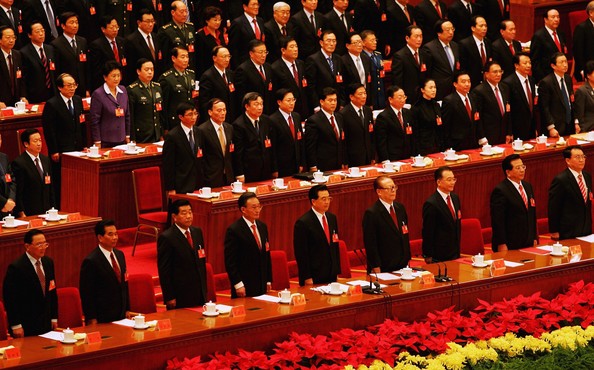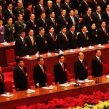
CCP Party Apparatchiks Gaining at the Expense of Technocrats
Publication: China Brief Volume: 9 Issue: 25

The latest reshuffle in the provincial-party leadership has validated a seminal trend in Chinese politics: the rise of party apparatchiks and the relative decline of technocrats. Early this month, the Chinese Communist Party (CCP) Organization Department announced two promotions: Hebei Governor Hu Chunhua was made Party Secretary of the Inner Mongolia Autonomous Region, while Agriculture Minister Sun Zhengcai became Party Secretary of northwestern Jilin Province. Hu and Sun, both 46, have thus become the two most senior members of the Sixth-Generation leadership, a reference to top-level cadres born in the 1960s. Other personnel movements in the past year have reinforced the ascendancy of danggong or party affairs specialists over professional administrators. The Politburo will, early next year, begin preparations for the 18th CCP Congress of 2012, when the bulk of Central Committee and Politburo members will retire in favor of Fifth- and Sixth-Generation cadres. The preeminence enjoyed by a cohort of party functionaries can have a lasting impact on not only the composition of China’s ruling team but also the country’s policy orientations in the coming decade or so.
While Sun, a respected agronomist with a doctorate in agriculture, can be classified as a technocrat, Hu and the bulk of Sixth-Generation rising stars are career danggong with little exposure to portfolios in the economics, trade, foreign affairs or technology portfolios. The latter group includes Governor of Hunan Province Zhou Qiang, 49; Chairman of the Xinjiang Autonomous Region Nur Bekri, 48; Party Secretary of the Communist Youth League (CYL), Lu Hao, 42; Party Secretary of the Hebei boom town of Tangshan, Zhao Yong, 46; and Party Secretary of Hefei, capital of Anhui Province, Sun Jinlong, 47. Most of these young Turks are already in the Central Committee as either full or alternate members. Moreover, Hu Chunhua, Jilin’s Sun as well as Hunan’s Zhou stand a good chance of being promoted to Politburo members at the 18th Party Congress (China News Service, December 1; Ming Pao [Hong Kong] December 2; Global Times [Beijing], December 3).
There are several reasons behind the growing prominence of party apparatchiks. Firstly, most of them are ranking members of the so-called CYL Faction, which is headed by Party General Secretary and President Hu Jintao, 67. Hu Jintao, Hu Chunhua—who are not related—as well as Hunan’s Zhou are former party bosses of the league. Since becoming party chief in 2002, Hu and close aides such as Director of the CCP Organization Department Li Yuanchao—a Politburo member who is also a CYL stalwart—have elevated a few dozen CYL alumnae to important slots at both the central and regional levels. The most high-profile Sixth-Generation CYL Faction member is undoubtedly Hu Chunhua, who, like President Hu, had a remarkable career in the Tibet Autonomous Region. The younger Hu is even deemed a probable successor to Vice-President Xi Jinping, who is the odds-on favorite to become party general secretary at the 18th Party Congress, when the older Hu is expected to retire from the Politburo (Le Monde [Paris], December 5; Straits Times [Singapore], December 9).
President Hu’s preference for danggong veterans over technocrats is in line with the practice of ex-president Jiang Zemin. Eight among the nine members of the Politburo Standing Committee (PBSC), China’s supreme ruling council, are career party functionaries who have served as party secretaries in major provinces. The exception is Premier Wen, who has been both a party affairs specialist in the CCP headquarters and a State Council technocrat. In addition, 18 among the 25 Politburo members are either former or serving provincial party secretaries. According to the respected party journal Decision-Making, salient attributes of provincial party secretaries include the power of “political discrimination”; ability to grasp the “big picture”; capacity for strategic thinking; and ability to appoint capable underlings and to build a good image for the party (Global Times, December 7; Chongqing Evening News [Chongqing], December 6).
Most significantly, given their expertise in Marxist ideology, CCP dogma and propaganda work, senior danggong are considered more politically savvy and “trustworthy” than numbers-crunching experts handling finance or trade portfolios in the government. Since the 17th Party Congress in 2007, Vice-President Xi and Li Yuanchao, who are Politburo members in charge of organization and personnel matters, have made scores of speeches on ways of identifying neophytes with potential for top-echelon posts. While Third-Generation leaders including Deng strove to strike a balance between “redness” (ideological purity and political correctness) and expertise (professional competence), President Hu, Xi and Li have come down heavily in favor of de, meaning “morality”, and in the CCP context, political rectitude and readiness to toe the Beijing line. Li has reiterated that cadres being groomed for fast-track promotion “should pass muster in both de and competence, with priority given to de.” “Quite a number of cadres have gone astray not due to the question of professional competence but because of lapses in morality,” the Organization Department Chief said last month (People’s Daily, December 1; Outlook Weekly [Beijing], November 30).
By contrast, only a handful of well-regarded Sixth-Generation technocrats seem destined for the top. They include the Chairman of China Commercial Aircraft Co., Ltd. (CCAC), Zhang Qingwei, 48, and the President of the mammoth oil monopoly Sinopec, Su Shulin, 49. A famous rocket scientist who played a key role in China’s space program, Zhang served briefly as Minister at the Commission of Science, Technology and Industry for National Defense a few years ago. Su spent his entire career in the oil and gas sector, except for two years as a ranking member of CCP Committee of Liaoning Province (Businessweek, November 4; lanyue.com [Beijing], December 2). According to time-honored practice, however, cadres who have excelled in the fields of industry, business and technology face a glass ceiling after reaching the level of minister. It is most unusual for technocrats to be inducted into the policy-setting Politburo. Zhu Rongji, the Deng protégé who was prime minister from 1998 to 2003, is one of the few exceptions of a technocrat who made it to the PBSC.
Moreover, even among technocrats who are expected to play a big role in central government ministries after the 18th Party Congress, few of them are “returnees,” a reference to officials and professionals with advanced degrees from the United States and Europe. For instance, both Zhang and Su are graduates of Chinese universities. By contrast, several ministers in the first and second Wen Jiabao cabinets, including Health Minister Chen Zhu, Minister of Science and Technology Wan Gang and former Education Minister Zhou Ji boast doctorates from well-known universities in the West. Wan, an award-winning auto engineer and Chen, a specialist on leukemia, also spent several years working in senior positions in Germany and France respectively (New York Times, April 10; Newsweek International, April 6). Partly due to their relatively sensitive portfolios, however, the majority of career party functionaries, particularly those affiliated with the CYL, have neither studied nor worked in the West.
The contrasting political fortune of apparatchiks versus that of technocrats may adversely affect the ability of the CCP to adapt itself to the fast-shifting realities of the 21st century. In major addresses on the future of the party and country, President Hu and Vice-President Xi have put emphasis on innovation and theoretical breakthroughs. For example, in his much-noted speech a year ago marking the 30th anniversary of the start of the reform era, Hu underscored the imperative of the spirit of “bold exploration and brave innovation” in reforming party institutions and government policies (Xinhua News Agency, December 18, 2008). In order to satisfy the “morality” criterion, however, danggong veterans seem more adept at demonstrating political trustworthiness and avoiding mistakes than at trying out new ideas that may be deemed controversial and ideologically suspect. Moreover, apparatchiks’ lack of exposure to areas such as international finance and foreign trade has constrained their ability to keep abreast of the latest economic and IT developments in a fast-changing world.
Even more disturbing is the trend that more and more graduates from top institutes of learning such as Peking University and Tsinghua University have opted for danggong careers. This is in the footsteps of both Hu Jintao and Hu Chunhua, who decided in 1966 and 1983 respectively to become party cadres immediately upon graduation from these elite colleges. The past few years have witnessed a phenomenal increase in college graduates applying for the post of party secretary or vice-party secretary in grassroots administrative units ranging from villages to counties. Last year, more than 66,000 university graduates were appointed village-level cadres. This was equal to the aggregate number of college-educated rural officials who had been hired for such jobs in the previous 15 years. Also rising rapidly are the numbers of male and female students who want to join the army upon graduation. A record 130,000 college graduates were recruited by the PLA this year. A stint in the PLA is a much-valued experience that can help young men and women advance their careers as party functionaries (People’s Daily, October 21; Guangzhou Daily [Guangzhou], October 31; China Youth Daily [Beijing], April 22). While this trend may have been partially caused by rising unemployment among new graduates this year, there is little question that college students see a bright future ahead as party functionaries.
The rising political fortune of apparatchiks perhaps explains the CCP’s increasingly tight embrace of the traditional canon. This has been evidenced by the resuscitation of Maoist values particularly in a number of central and western provinces and cities (See “The CCP’s Disturbing Revival of Maoism,” China Brief, November 19). By contrast, technocratic officials are much more conscious of the need to sell Chinese products—as well as China’s image—abroad in the age of globalization. As such, professional managers and administrators seem generally less willing to be identified with political campaigns of previous generations. Very much in the tradition of ex-premier Zhu and Premier Wen, they usually make an effort to steer clear of the ideological issues. The stranglehold that danggong veterans have over top-echelon slots in the party-and-government apparatus, however, seems to render it unlikely that China can make a clean break from orthodox norms of yesteryear.





